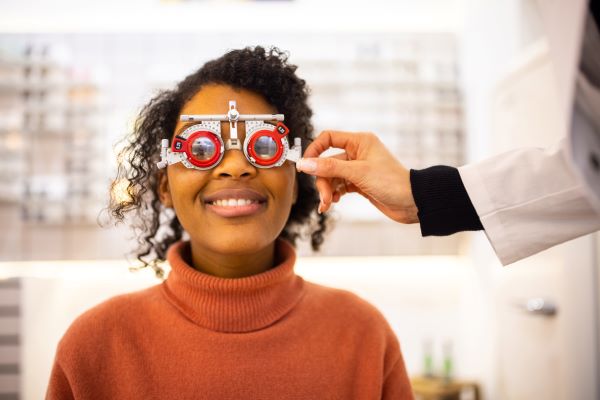Did you know your eye muscles are the fastest muscles in your body? They can contract in less than a 100th of a second, they contain 120 million light-sensitive cells, and they can tell the difference between 10 million colours.
Is it any wonder then that 3 in 4 people in Australia consider their eyesight to be their most valued sense?1 Yep, your peepers are pretty amazing, but they need protecting.
Here’s what you can do to help look after your eye health.
1. Get your eyes checked, even if you don’t have symptoms
Eye tests aren’t just for people with glasses. Even if you’re not experiencing any symptoms (such as itchy eyes or blurry vision), it’s still important to make eye tests with an optometrist a regular part of your health routine.
In Australia, you don’t need a referral to book an appointment with an optometrist for a routine eye test.
How often should you get an eye test?
Optometrists generally recommend getting your eyes tested every two years. Your doctor or optometrist may recommend getting your eyes tested more frequently if you have an existing eye condition (such as short or far sightedness) or certain medical conditions, including:
- diabetes
- high blood pressure
- neurological conditions
- stroke.
You should also book an eye test or see your doctor if you notice any symptoms or changes to your vision.
It’s recommended that children have a full eye examination with an optometrist before they start school.

100% back on optical on eligible extras
At Medibank we think you deserve to see the world clearly. That’s why when you join eligible Medibank extras you get 100% back on optical items at all recognised providers up to annual limits.*
Why are regular eye tests important?
Just like a dental check-up, regular eye tests should be an essential part of your healthcare routine.
Changes to your eye health can occur slowly, without noticeable symptoms. Regular check-ups with an optometrist can help identify any issues early on, allowing you to start treatment as soon as possible. Starting treatment early gives you a better chance to prevent or minimise any damage to your eyes and vision.
In Australia, 90% of vision loss and vision impairment is preventable or treatable if detected early.2
Glaucoma, cataracts and macular degeneration are all conditions that can be detected early by routine eye tests.
READ MORE: How to treat tired, dry or itchy eyes
2. Know your family’s eye health history
Take an interest in your family’s health history and learn about any eye conditions that have occurred within your family tree. Have your parents, grandparents or siblings experienced eye disease? Do they wear glasses or contact lenses? Some eye conditions are genetic, so having the conversation with your loved ones and building up your health knowledge is a great way to be proactive about taking care of your eyes for the long-term.
3. Eat, move and feel better
Healthy food choices and making time each day for exercise can support you to achieve and maintain a healthy weight and ensure your body is getting the nutrients it needs. Plus, a balanced diet full of green leafy vegetables, fresh fruits, nuts and fish are all good for your eyes, so add some healthy colour to your plate and your peepers will thank you for it!
4. Avoid smoking
Smoking contributes to the early development of age-related macular degeneration, which is the most common cause of blindness in the Western world. Quitting smoking or being a non-smoker can help ensure that healthy eyes and good vision are maintained for as long as possible.
5. Watch your screen time
If you’re someone with a high screen time, there are precautions you can take to help protect your eyes. Position yourself at least an arm's length away from your desktop computer screen and avoid holding any screen too close to your eyes. Every 20 minutes, take a break by focusing on something about 6 meters away for around 20 seconds. Ensure your room is well-lit and free from screen reflections.
READ MORE: What is myopia and why is it on the rise?
6. Protect your eyes
Just like layering on sunscreen and protective clothing to shield your skin from the sun, don’t forget to protect your eyes from harmful UV by always wearing sunglasses and a hat when you’re outside. Combining sunglasses and a sun-safe hat can reduce UV radiation from reaching your eyes by up to 98%, according to the Cancer Council.3 Keep a pair of safety eyewear or protective goggles handy at home to use when working with gardening equipment or chemicals around the house or backyard too.

Your peepers are amazing
Treat them to 2 designer single vision pairs from the $249 range at Specsavers. No gap. PLUS earn 5 Live Better rewards points for every $1 spent. T&Cs, eligibility and exclusions apply.#

